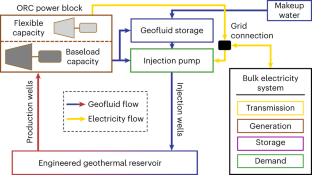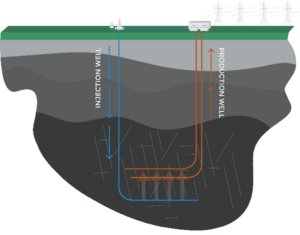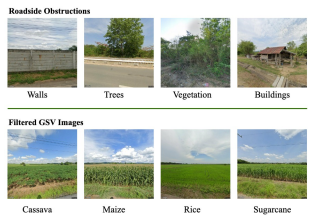2024-02-16 プリンストン大学

A diagram illustrating the enhanced geothermal approach employed by Fervo Energy. Fluid is first injected at the injection well, flows through engineered fractures in subsurface rock, picking up heat along the way, and then returns to the surface via production wells to generate electricity. The process creates a self-contained underground radiator that can function as a type of energy storage system (courtesy of Fervo Energy).
◆この研究では、エンハンスド地熱(EGS)と呼ばれる新技術のエネルギー蓄積特性を活用し、柔軟な地熱発電が可能であることが示された。これにより、地熱エネルギーは、グリッド上でのニッチな存在から、脱炭素化した未来の主要な構成要素に変わる可能性がある。
◆地熱の柔軟な運用は、風力や太陽光などの間欠的なエネルギー源と相補的になるため、その価値が大幅に向上する。これにより、地熱発電所の最適設置容量が増加し、西部アメリカにおける清潔エネルギーの導入量が大幅に増加する可能性がある。
<関連情報>
- https://engineering.princeton.edu/news/2024/02/16/flexible-geothermal-power-approach-combines-clean-energy-built-battery
- https://www.nature.com/articles/s41560-023-01437-y
- https://www.sciencedirect.com/science/article/abs/pii/S0306261922002537
脱炭素電力システムにおける柔軟な地熱発電の役割 The role of flexible geothermal power in decarbonized electricity systems
Wilson Ricks,Katharine Voller,Gerame Galban,Jack H. Norbeck & Jesse D. Jenkins
Nature Energy Published:15 January 2024
DOI:https://doi.org/10.1038/s41560-023-01437-y

Abstract
Enhanced geothermal systems (EGSs) are an emerging energy technology with the potential to greatly expand the viable resource base for geothermal power generation. Although EGSs have traditionally been envisioned as ‘baseload’ resources, flexible operation of EGS wellfields could allow these plants to provide load-following generation and long-duration energy storage. In this work we evaluate the impact of operational flexibility on the long-run system value and deployment potential of EGS power in the western United States. We find that load-following generation and in-reservoir energy storage enhance the role of EGS power in least-cost decarbonized electricity systems, substantially increasing optimal geothermal penetration and reducing bulk electricity supply costs compared to systems with inflexible EGSs or no EGSs. Flexible geothermal plants preferentially displace the most expensive competing resources by shifting their generation on diurnal and seasonal timescales, with round-trip energy storage efficiencies of 59–93%. Benefits of EGS flexibility are robust across a range of electricity market and geothermal technology development scenarios.
地熱発電の柔軟な発送電のための貯水池内エネルギー貯蔵の価値 The value of in-reservoir energy storage for flexible dispatch of geothermal power
Wilson Ricks, Jack Norbeck, Jesse Jenkins
Applied Energy Available online:7 March 2022
DOI:https://doi.org/10.1016/j.apenergy.2022.118807
Highlights
•Enhanced geothermal power plants are capable of time-shifting generation via modulation of injection and production rates.
•Hydraulically confined reservoirs enable accumulation and discharge of pressurized geofluid.
•In-reservoir energy storage can achieve durations ¿100 hours.
•Energy storage is more valuable in systems with high wind and solar penetration.
•Flexible operations improve the economic viability of enhanced geothermal systems.
Abstract
Geothermal systems making use of advanced drilling and well stimulation techniques have the potential to provide tens to hundreds of gigawatts of clean electricity generation in the United States by 2050. With near-zero variable costs, geothermal plants have traditionally been envisioned as providing “baseload” power, generating at their maximum rated output at all times. However, as variable renewable energy sources (VREs) see greater deployment in energy markets, baseload power is becoming increasingly less competitive relative to flexible, dispatchable generation and energy storage. Herein we conduct an analysis of the potential for future geothermal plants to provide both of these services, taking advantage of the natural properties of confined, engineered geothermal reservoirs to store energy in the form of accumulated, pressurized geofluid and provide flexible load-following generation. We develop a linear optimization model based on multi-physics reservoir simulations that captures the transient pressure and flow behaviors within a confined, engineered geothermal reservoir. We then optimize the investment decisions and hourly operations of a power plant exploiting such a reservoir against a set of historical and modeled future electricity price series. We find that operational flexibility and in-reservoir energy storage can significantly enhance the value of geothermal plants in markets with high VRE penetration, with energy value improvements of up to 60% relative to conventional baseload plants operating under identical conditions. Across a range of realistic subsurface and operational conditions, our modeling demonstrates that confined, engineered geothermal reservoirs can provide large and effectively free energy storage capacity, with round-trip storage efficiencies comparable to those of leading grid-scale energy storage technologies. Optimized operational strategies indicate that flexible geothermal plants can provide both short- and long-duration energy storage, prioritizing output during periods of high electricity prices. Sensitivity analysis assesses the variation in outcomes across a range of subsurface conditions and cost scenarios.




